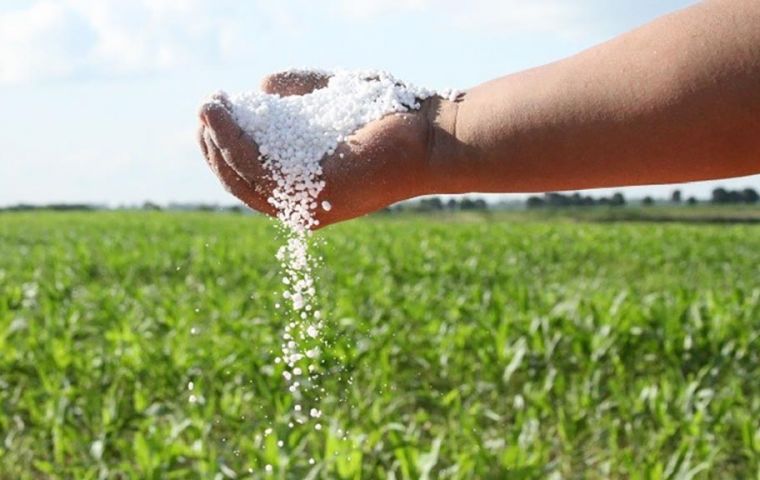MercoPress. South Atlantic News Agency
Fertilizer congress reveals Brazil's efforts in accessing the input and the need to promote a national industry
 Agriculture minister Marcos Pontes talked about the Fertilizer Diplomacy implemented by Brazil to have access to the much needed input
Agriculture minister Marcos Pontes talked about the Fertilizer Diplomacy implemented by Brazil to have access to the much needed input The ninth edition of the Brazilian Fertilizer Congress, organized by ANDA, (Brazilian National Fertilizers Organization) underscored the main difficulties faced by the agriculture sector in having access to fertilizer at a time of global logistics chaos caused by the Covid-19 pandemic and Russia’s invasion of Ukraine.
In effect almost 80% of all fertilizers used in Brazil are imported. Much of it from Russia. ANDA stats showed that in the first half of this year the leading suppliers of fertilizer to Brazil were Russia (18%), China (10%), Canada (8%), the United States (8%), Spain ( 5%), plus Morocco, Israel, and Egypt, with 4% each.
Brazil, as the world’s fourth largest global food producer, only trailing behind China, the United States and India, plays an important role in the global supply of food, exporting a large part of its production, which makes access to fertilizers essential and having its own national production.
According to the Minister of Agriculture, Marcos Pontes, who served as the keynote speaker for the ANDA event, the restrictions imposed by Western countries on Russia forced Brazil to take several actions to secure the product, such as the so-called Fertilizer Diplomacy adopted by the Ministry of Agriculture in partnership with Russia.
Another example is Brazil’s National Fertilizer Plan, launched in May, which aims to reduce external dependence on various types of fertilizers in the medium and long term from 85% to about 50%.
The lack of agriculture inputs and food items is such a grave threat to food security that, on August 20, the UN Secretary-General, Antonio Guterres, stated that fertilizers, as well as Russian agricultural exports, must be able to reach world markets “unimpeded,” despite Western sanctions.
“It is important that all governments and the private sector cooperate to bring them to market,” he said from the Joint Coordination Center (JCC), which oversees the implementation of the Ukrainian grain export agreement signed in July by Kyiv and Moscow, with the United Nations and Turkey as guarantors.
Another topic addressed at the conference was the logistics infrastructure necessary for receiving these inputs. Despite the pandemic, the port sector showed where it stands in contributing to the Brazilian economy, according to the director of the Department of Port Management and Modernization – SNPTA from the Ministry of Infrastructure, Otto Luiz Burlier.
In his opinion, in addition to investments in infrastructure, Brazil is focused on improving processes and deploying logistics intelligence projects to enhance the quality of services, such as Porto sem Papel (paperless port, an initiative aimed at aiding ports to become more digitally connected).
Sérgio Sukadolnick, vice president of the Brazilian Association of Transport and Logistics of Dangerous Products ABTLP/Grupo Cesari, emphasized some logistics challenges for receiving these inputs and transporting grain production, such as a lack of risk management in transportation, terminal deficiencies, and a lack of sufficient storage space, as well as bureaucracy, which has an impact on productivity, taxes, and high logistics costs in Brazil.
According to Sukadolnick, while in OECD countries and the United States, logistics cost represent 10% of the value of fertilizers in the market, in Brazil it accounts for about 25 to 30% of the final cost. In addition, there is a lack of investment in railways, such as the integration of the rail network, insufficient waterways transport, and dredging ports to ensure competitiveness.




Top Comments
Disclaimer & comment rulesCommenting for this story is now closed.
If you have a Facebook account, become a fan and comment on our Facebook Page!